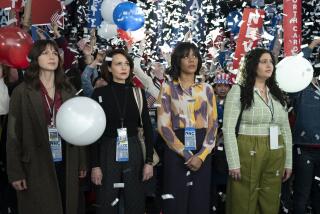TV REVIEW : An Undramatic ‘One Vote’ Depicts Suffragists’ Struggle
- Share via
Anyone interested in the cause of intelligent television has to be grateful for producer Lucy Pollak’s two-hour “American Experience” special, “One Woman, One Vote.” Many viewers--especially young, female ones--should gain something from this narrative history of the U.S. campaign to secure women’s right to vote.
But will those young, female viewers, along with everyone else, still be awake by the time the suffragists end their 72-year campaign in triumph in 1920? Pollak’s film is a nonstop parade of talking academic heads and black-and-white photos and film clips; it lends one of the country’s most colorful political movements such a dull monochrome look that the history lessons may not be heard.
Among those lessons is the inevitability of splits inside radical causes. Almost from the beginning, when Elizabeth Cady Stanton called for women’s suffrage in 1848, conservative and radical factions drove the women’s movement forward. Later in the 19th Century, a third group of women opposed to the suffragists rose up. The liquor industry (fearing that voting women would usher in prohibition laws) and manufacturing interests (fearing safety laws for female workers) were not the only enemies of the vote.
While Pollak’s film gives due credit to Mary Church Terrell and her African American suffragists, it also notes that the need to cajole white Southern legislative votes to pass a constitutional amendment compelled otherwise progressive women to essentially ignore their black allies. Well before they had the vote, American women were drinking deep from the sometimes brackish water of politics.
“One Woman, One Vote” is simply too undramatic for its subject, falling far short of the kind of emotional appeal called for by Carrie Catt, “general” of parading female activists in the early 1900s. Only in engaging passages such as the wild campaign to win women’s suffrage in Colorado, or in the nearly tragic 1917 hunger strike led by radical Alice Paul, does this study suggest the gigantic effort of democratic reform.
It does, though, suggest the rewards of that effort, the sweetest of American victories.
* “One Woman, One Vote” airs at 8:30 tonight on KCET-TV Channel 28 and KPBS-TV Channel 15, and at 8 p.m. on KVCR-TV Channel 24.
More to Read
The complete guide to home viewing
Get Screen Gab for everything about the TV shows and streaming movies everyone’s talking about.
You may occasionally receive promotional content from the Los Angeles Times.






